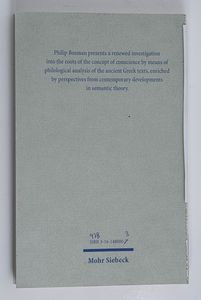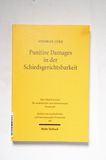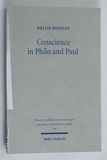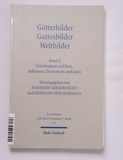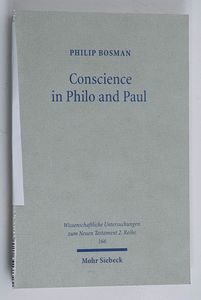
Conscience in Philo and Paul
Netto: 21.80 €23,33€
inkl. MwSt. zzgl. Versand
Bearbeitungszeit: 3 Werktage
Sofort lieferbar (auf Lager)
1x Stück verfügbar
Buchzusammenfassung:
Philip Bosman explores the history of the concept of conscience. As a cognitive construct, the meaning of the ancient concept must be derived from the historical conceptual framework within which it features. As the modern term evolved from the Greek synoida word group, the author follows its history of development, from initial verbal phrases expressing an awareness of having done something wrong, to the later substantives referring to an inner entity monitoring the behaviour of the individual. Prominent aspects of the conceptual framework are explained from the Ancient Greek system of values, i.e. in terms of vulnerability, shame, and lack of parrhesia. Philo and Paul receive detailed attention because of the significant frequency and manner of usage in which the substantive forms of the word group appear in their writings. It is shown that conscience in Philo and Paul closely relates to its linguistic and conceptual prehistory, but that both authors use the word group innovatively in various ways, contributing to the formation of a construct of human cognition destined to play an immense role in the theology and ethics of the modern world.
FAQ zum Buch
Aristoteles verknüpft den Begriff „κακός“ (das Übel) mit der Feindschaft oder dem Zorn anderer Menschen, die in der Lage sind, Schaden zuzufügen. Dieses Übel wird als Auslöser der Angst angesehen, insbesondere wenn das eigene Schicksal von anderen abhängt. Dieses FAQ wurde mit KI erstellt, basierend auf der Quelle: S. 106, ISBN 9783161480003
Socrates Leben diente als Vorbild für die Anforderungen des “neuen“ Weltbildes, da seine Praxis der “Selbstbeherrschung“ zentral für die Hellenistische Fokussierung auf “Technologien der Selbst“ war. Sein Beispiel symbolisierte eine neue Vorstellung des idealen Menschen, der vollständig reflektiert und selbstbestimmt lebte. Dieses FAQ wurde mit KI erstellt, basierend auf der Quelle: S. 191, ISBN 9783161480003
Das Konzept des inneren Gerichtshofs wird in Philos Werk als metaphorische Darstellung psychologischer Prozesse beschrieben, die durch juristische Begriffe beeinflusst sind. Es steht in Verbindung mit der Vorstellung, dass die Seele der Raum ist, in dem das Gewissen als Zeuge in einem äußeren Gerichtshof wirkt, ohne dass die Griechen oder Römer den inneren Prozess der Anklage und Verurteilung direkt als Gerichtshof konzipierten. Dieses FAQ wurde mit KI erstellt, basierend auf der Quelle: S. 194, ISBN 9783161480003
Paulus „συνείδησις“ überwacht alle Arten von Handlungen und registriert Abweichungen vom Norm der Rechten und Güten, einschließlich der inneren Einstellungen, die das Verhalten antreiben. Sie reagiert insbesondere auf innere Konflikte zwischen dem Wissen vom Guten, der Absicht und dem eigentlichen Verhalten. Dieses FAQ wurde mit KI erstellt, basierend auf der Quelle: S. 276, ISBN 9783161480003

